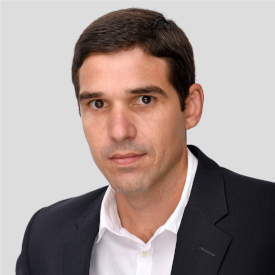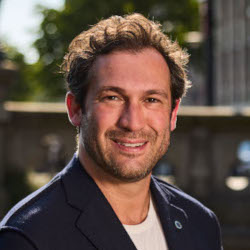Market Boosted by Clean Energy Push and Closer Portugal Ties
_1.jpg)
By Luke King
Project cargo specialists in Brazil are enjoying brisk business in Latin America’s largest economy, helped by an expansion in oil and gas and clean energy projects and an uptick in trade with its former colonial power, Portugal. Executives from the Port of Açu, FOX Brasil and Trans Global Projects assess the latest opportunities.
From Issue 4, 2024 of Breakbulk Magazine.
(7-minute read)
Breakbulk specialists are, for now, shrugging off fears about Brazil’s fiscal fragility - interest rates and public debt remain stubbornly high – and enjoying brisk business in Latin America’s largest economy.
The country is making progress towards its goal of regaining its investment grade status, with Moody upgrading its credit outlook for Brazil from “stable” to “positive” in May – the first revision since 2018.
Another encouraging indicator is an uptick in trade between Brazil and the former colonial power, Portugal. Brazilian president Lula da Silva is reportedly keen to revive ties with Portugal after several years of cool relations – a shift that could boost business for project forwarders in both Lusophone countries.
In 2023, EDP produced the first molecule of green hydrogen in the whole of Latin America (in the Brazilian state of Ceará) and aims to carve a role for Portugal as a gateway of hydrogen into Europe, via the Port of Sines.
In addition to EDP Brasil’s pilot project, the Government of Ceará has signed 24 Memorandums of Understandings (MOUs) to implement green hydrogen projects and, in the coming years, Portuguese energy companies EDP and GALP plan to invest €5.7 billion to develop major energy projects in Brazil.
 In an interview conducted at Breakbulk Europe in Rotterdam, João Braz, chief commercial officer at the Port of Açu on Brazil’s east coast, said the port was in discussion with a number of Portuguese companies regarding energy transition projects.
In an interview conducted at Breakbulk Europe in Rotterdam, João Braz, chief commercial officer at the Port of Açu on Brazil’s east coast, said the port was in discussion with a number of Portuguese companies regarding energy transition projects.
He pointed to the signing of an MOU by Ocean Winds, a 50-50 joint venture between EDP and Brazilian utility company Engie, to make Açu a primary hub for the installation, commissioning, operation and maintenance of offshore wind farms in Brazil’s Southeast region.
“There is a lot of potential for partnership between Brazil and Portugal and the Port of Açu has a unique opportunity,” Braz said. “There is no other port in the country with availability and potential connectivity to the national gas network, which is a facilitator for attracting industries and will enable the production of nitrogen and urea. We would also highlight wind and solar, and that the coast off Port of Açu is one of the windiest parts of the country.”
Unaffected by the space constraints that are putting a squeeze on Northern Europe’s ports, Açu boasts an area of 1 million square meters that has been licensed for the installation of a low-carbon hydrogen hub.
“Granted by the Government of Rio, the license facilitates companies that want to build and operate green hydrogen plants in the Port of Açu, which in the future will become a hydrogen hub that can house several plants simultaneously.
For the final phase of the hub’s installation, production in Port of Açu is expected to be 561.8 kton per year of green hydrogen and 43,000 tons of blue hydrogen,” added Braz.
Diversifying for the Future
The port executive echoed the sentiment expressed by panelists at the Breakbulk Europe event who told the audience that fossil fuels would remain a key source of business for many years to come.
“40% of Brazil’s oil is exported via our port, so oil and gas will continue to be one of the main activities in the port. But like the rest of the world, we are also diversifying,” Braz said.
Port of Açu – in which the Port of Antwerp has invested US$ 10 million – made the most of their visit to Breakbulk Europe by holding meetings with one of their major customers, the Navigator Company, Portugal’s main producer of green energy from biomass.
Açu is already handling Navigator logs and wood chips – at first glance a rather routine cargo, but an essential one that makes its way across Europe and goes on to power all manner of green projects.
Brazil’s only privately-owned port, Açu now hopes to increase its volumes by consolidating the shipments of wood products that currently are exported by other Brazilian ports, and eventually opening a processing facility for the products in Açu.
“One of the Port of Açu’s other big bets now is on the market for sustainable decommissioning of oil platforms,” concluded Braz, pointing out that in its strategic plan for 2024- 2028, state owned energy company Petrobras expects to spend US$ 11 billion on decommissioning activity.
Positive Sentiment
Breakbulk Europe exhibitor Trans Global Projects (TGP) has a long-established presence in Brazil dating back to 2005, including offices in São Paulo, Rio de Janeiro and Belo Horizonte.
Renato Mello, managing director of Trans Global Projects in Brazil, attended the Rotterdam event and said the improved economic outlook for his home country, as noted by the OECD, has contributed to a more positive business sentiment.
“The project cargo market in Brazil is currently experiencing steady growth, driven by infrastructure development and investment in the energy sector,” he said.
“Compared to its neighbors, Brazil shows significant potential for future breakbulk activity due to its large-scale projects and extensive natural resources. While countries like Argentina and Colombia also present opportunities, Brazil’s market size and project pipeline position it favorably for future growth.
“This optimism is reflected in increased investments and project initiations across various sectors, including construction and energy. As a result, the project cargo sector is experiencing heightened activity, with more projects coming online and an increased demand for specialized logistics services.”
Looking ahead, Mello said: “We agree with the panelists at Breakbulk Europe that oil and gas will remain a dominant market for project cargo activity in the near future. TGP Brazil is heavily involved in energy projects, with a significant portion of our activity dedicated to the oil and gas sector. However, we are also seeing a growing demand for renewable energy projects, and our operations are increasingly focusing on this segment, balancing our portfolio between fossil fuels and renewables.”
Mello cautioned that the breakbulk business wasn’t all smooth sailing, however. “Moving project cargo in Brazil presents several challenges, including regulatory complexities, infrastructure bottlenecks and logistical hurdles in remote areas.
“To facilitate the movement of oversized freight, significant investments are needed in road and rail infrastructure, streamlined regulatory processes and advanced logistics technology. These improvements would enhance efficiency and reduce transit times for project cargo.”
‘Opportunities Everywhere’
Exhibiting at Breakbulk Europe as part of The Heavy Lift Group (THLG), Murilo Caldana, project director at Sao Paulo-based forwarder FOX Brasil, also noted an increase in joint Portuguese-Brazil investments and pointed to projects FOX has carried out in partnership with L.Branco - Navegação e Trânsitos, the network’s member for Portugal.
 Joint cooperation was especially visible in the infrastructure and the energy sectors, Caldana said, though he noted this did not materially affect the exchange of goods between the two countries, since Brazil already produces much of the heavy equipment needed for projects, such as turbines, transformers and generators.
Joint cooperation was especially visible in the infrastructure and the energy sectors, Caldana said, though he noted this did not materially affect the exchange of goods between the two countries, since Brazil already produces much of the heavy equipment needed for projects, such as turbines, transformers and generators.
He added: “Aside from renewables, there are still many oil and gas projects in Brazil, a few thermal power plants, refineries and FPSO units – there are plenty of opportunities in the energy segment. I always look positively to the project cargo market in Brazil, simply because we are a country in development.”
His otherwise positive outlook was tempered only by Brazil’s perennial issues related to “infrastructure in remote areas, the distances involved in transporting cargo in such a huge country, regulations and bureaucracy.”
Asked how Brazil’s project cargo pipeline compared to that of other Latin American countries, Caldana concluded: “I don’t like to draw comparisons with our neighbors because you have opportunities everywhere – just check what is happening now in Guyana,” he said, referring to an oil boom in that country which is generating GDP growth rates as high as 30%.
“It’s not only the size of the economy, but the overall opportunities for growth that really generate project cargo.”
The Port of Sines, the Port of Antwerp, THLG and TGP are exhibitors at Breakbulk events.
The next event in the calendar is Breakbulk Americas 2024, taking place on 15-17 October at the George R. Brown Convention Center in Houston.
MAIN PHOTO: Trans Global Projects has been active in Brazil since 2005. CREDIT: TGP
